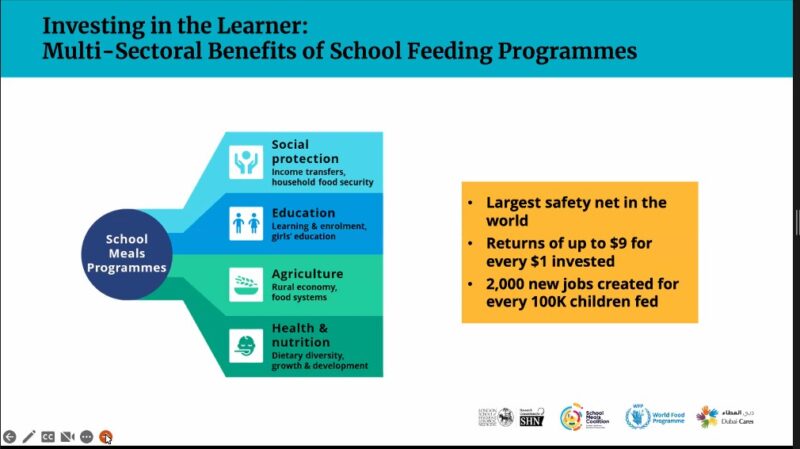Africa is facing a crisis in education, but this is fundamentally a broader crisis in the condition of children. Over 97 million children in Africa are out of school; 52 million are girls. As the world emerges from the effects of COVID -19, these barriers have been compounded, leaving behind hundreds of thousands of African children who have failed to return to school, including marginalised adolescent girls, whose issues will continue to be overlooked if not prioritised.
The Graça Machel Trust is driving an advocacy agenda to ensure that adolescent girls are put at the centre of the African policy agenda by supporting the development and implementation of advocacy campaigns driven by teenage girls. This will ensure that they unleash their strengths, exercise full agency over their lives, and challenge social norms that constrict them from growing into a new generation of strong African women.
The recent launch of the Sustainable Financing Initiative (SFI) School Health and Nutrition, which the School Meals Coalition hosted on Tuesday, July 19th, 2022, was a reminder to governments and donors to reconsider and put in place long-term finance plans to increase school feeding programs and policies with a particular focus on low- and lower-middle-income countries.
To support the SFI School Meals Coalition’s efforts of amplifying research and advocating for better financing of school meals, the Trust’s Chief Executive Officer Melizsa Mugyenyi joined high-level experts who discussed essential issues around financing challenges for school health and nutrition and the urgency for action that were raised during the SFI virtual launch.

GMT CEO Melizsa Mugyenyi at the launch of the Sustainable Financial Initiative
In her remarks, Ms Mugyenyi said, “Well-designed school, health and nutrition programmes are a proven and viable pathway to providing perhaps the best social safety net for vulnerable children. These programmes simultaneously afford benefits for multiple sectors such as education, agriculture, climate, social protection and health. They are smart strategies, offering an unmatched return on investment.” She echoed research presented by Professor Donald Bundy of the London School of Hygiene and Tropical Medicine, who said Education is an investment in human capital. “School meals programs benefit multiple sectors. 1 Dollar invested gets 9 Dollars in returns to social protection, agriculture, education, health and nutrition.”

Source: Economic Commission.
Ms Mugyenyi further shared what the Trust is doing to see that School Feeding and Nutrition programmes are on the development agenda across various platforms on the continent. The Trust is a signatory of the Global School Meals Coalition and joined the Sustainable Financing task force of the Coalition. Additionally, it has partnered with valued allies, including the African Union and World Food Programme.
Clear evidence by UNICEF and World Food Programme shows school meals are vital in ensuring children’s nutrition, growth and development, and they also provide a strong incentive for children, especially girls and those from the poorest and most marginalised communities, to return to school. The longer children are out of school, the greater the risk that they will drop out of education altogether. Girls face the added risk of forced transactional sex or early marriage.
The Trust does its bit in the form of evidence generation, and advocacy towards ensuring that progress made in the advancement of the Human Capital Investment Case is not forgotten. In Tanzania, Kenya, and Ethiopia, the Trust has partnered with the Global Partnership for Education – Knowledge and Innovation Exchange to generate evidence and data-driven responses towards scaling accelerated learning programs for out-of-school children with a focus on girls. This builds on its recent gains, bringing 23,000 Out of School children back into the school system.
Other speakers at the event included H.E. Céline Jurgensen, Ambassador, Permanent Representative of France to the United Nations in Rome, co-chair of the School Meals Coalition, Mr Leonardo Garnier, Special Adviser for 2022 Transforming Education Summit United Nations, former Minister of Planning and Economic Policy and Minister for Education, Costa Rica.
Under-Secretary-General Cristina Duarte, Special Adviser on Africa to the United Nations Secretary-General, former Minister of Finance and Planning, Republic of Cabo Verde, The School Meals Coalition and the Sustainable Financing Initiative Ms Tanja Grén and Hon. Gaspard Twagirayezu, Minister of State in charge of Primary and Secondary Education in the Ministry of Education of the Republic of Rwanda. The presentation of the Sustainable Financing Initiative under the School Meals Coalition umbrella was done by Dr Liesbet Steer, Executive Director, The Education Commission and Mr Kevin Watkins, London School of Economics, former CEO of Save the Children UK.


Presentation by Mr Kevin Watkins, London School of Economics, former CEO of Save the Children UK.
The SFI’s vision is to support the efforts of governments seeking to expand coverage of school meal programs through national action and international source mobilization. It has three main objectives:
- Identifying financing mechanisms at the domestic and international levels enabling long-term sustainable financing.
- Support development of national policy pathways for financing high-quality school meal programs.
- Obtain global recognition of school health and nutrition (SHN) as a transformational solution supported by more domestic and international financing.
They also proposed three action tracks: Analyze domestic and donor financing; Act to develop financing strategies; Amplify research, and advocate for better financing.










 The Trust supports and mobilises civil society networks on issues of ending child marriage, ending violence against children, ending female genital mutilation and promoting children’s rights, to carry out advocacy and action across Africa. Special focus is placed on Malawi, Mozambique, Tanzania and Zambia where child marriage continues to be a problem largely driven by poverty, gender inequality, harmful traditional practices, conflict, low levels of literacy, limited opportunities for girls and weak or non-existent protective and preventive legal frameworks.
The Trust supports and mobilises civil society networks on issues of ending child marriage, ending violence against children, ending female genital mutilation and promoting children’s rights, to carry out advocacy and action across Africa. Special focus is placed on Malawi, Mozambique, Tanzania and Zambia where child marriage continues to be a problem largely driven by poverty, gender inequality, harmful traditional practices, conflict, low levels of literacy, limited opportunities for girls and weak or non-existent protective and preventive legal frameworks.




 Education is a fundamental right for all children, which is also a vehicle for social, economic and political transformation in communities, countries and the African continent at large. Recent studies indicate a lack of progress in some of the critical commitments aimed at improving education quality, access, retention and achievement, particularly for girls. In most African countries, girls may face barriers to learning, especially when they reach post-primary levels of education. By implementing multi-dimensional approaches to education which includes core education, personal development, life skills and economic competencies, the Trust partners with funding partners, governments, civil societies and the private sector to improve education access.
Education is a fundamental right for all children, which is also a vehicle for social, economic and political transformation in communities, countries and the African continent at large. Recent studies indicate a lack of progress in some of the critical commitments aimed at improving education quality, access, retention and achievement, particularly for girls. In most African countries, girls may face barriers to learning, especially when they reach post-primary levels of education. By implementing multi-dimensional approaches to education which includes core education, personal development, life skills and economic competencies, the Trust partners with funding partners, governments, civil societies and the private sector to improve education access.

 The Nutrition and Reproductive, Maternal, New-born, Child and Adolescent Health and Nutrition, (RMNCAH+N) of the Children’s Rights and Development Programme aims at promoting the Global Strategy for women, children and adolescents’ health within the Sustainable Development Goals (SDG) agenda. The strategy emphasises on the importance of effective country leadership as a common factor across countries making progress in improving the health of women, children and adolescents.
The Nutrition and Reproductive, Maternal, New-born, Child and Adolescent Health and Nutrition, (RMNCAH+N) of the Children’s Rights and Development Programme aims at promoting the Global Strategy for women, children and adolescents’ health within the Sustainable Development Goals (SDG) agenda. The strategy emphasises on the importance of effective country leadership as a common factor across countries making progress in improving the health of women, children and adolescents. Through its Early Childhood Development (ECD) plan, The Trust will seek to put into action the new science and evidence Report that was presented by Lancet Series on Good and early development – the right of every child. This will be achieved by mobilising like-minded partners to contribute in the new science and evidence to reach all young children with ECD. The Trust’s goal is to be a catalyst for doing things differently, in particular, to rid fragmentation and lack of coordination across ECD sectors. In response to evidence showing the importance of political will in turning the tide against the current poor access and quality of ECD. Even before conception, starting with a mother’s health and social economic conditions, the early years of a child’s life form a fundamental foundation that determines whether a child will survive and thrive optimally.
Through its Early Childhood Development (ECD) plan, The Trust will seek to put into action the new science and evidence Report that was presented by Lancet Series on Good and early development – the right of every child. This will be achieved by mobilising like-minded partners to contribute in the new science and evidence to reach all young children with ECD. The Trust’s goal is to be a catalyst for doing things differently, in particular, to rid fragmentation and lack of coordination across ECD sectors. In response to evidence showing the importance of political will in turning the tide against the current poor access and quality of ECD. Even before conception, starting with a mother’s health and social economic conditions, the early years of a child’s life form a fundamental foundation that determines whether a child will survive and thrive optimally.